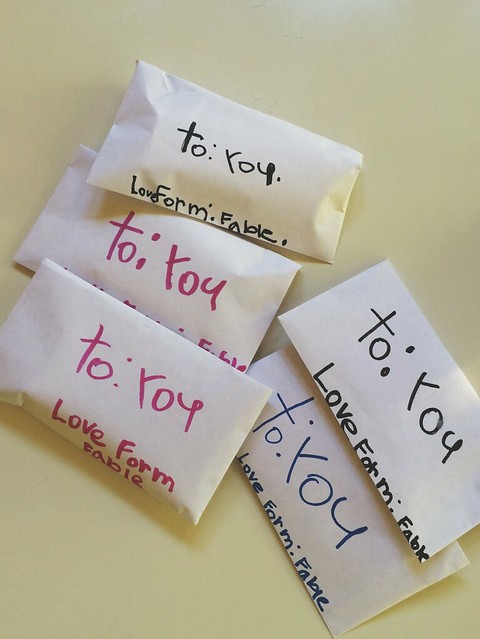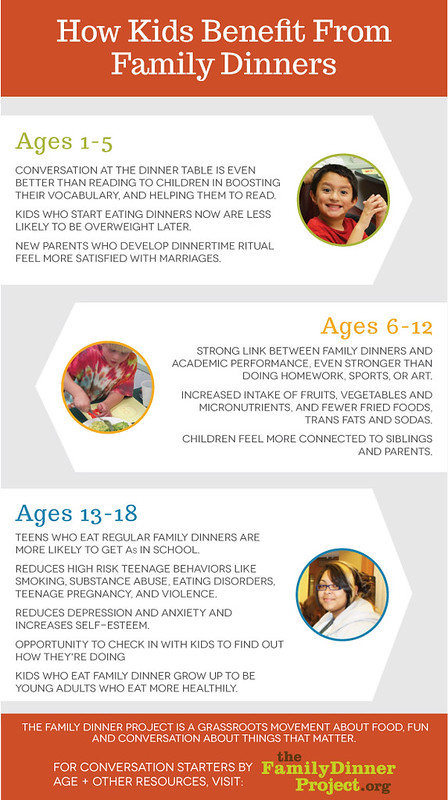Family dinners are not my strength -- or our strength, I should say. Family dinners were an EVERY NIGHT occurrence at our house growing up and even though I didn't want to participate much in my teen years, being made to sit at that table, every night, no matter how much homework I had or what boy just broke up with me or how much I hated my mother -- being together as we ate dinner, I realize in retrospect, was HUGELY beneficial to me and our family bond. Even though I kicked and screamed half the time.
That said, we do sit down with the kids as they eat, regardless of whether or not we're eating with them and when we do, we go around the table and talk about the highs and lows of our day. We also talk about what is happening -- in the world, in our country, community...
Our oldest is in 4th grade and he has a political stance all his own. He is deeply interested in global warming and what can be done to reverse its effects and Hal has made it his mission to deliver every piece of news that might engage Archer in his quest for more efficient energy.
What can we do as a family to do our part to save the world?
How can we, as a family, chip in and use less energy? Less water? Buy less stuff....?
How do we give back to our community? What can we donate? How can we be of service to others? What kind of example are we setting within our community? Why do you think that's important?
Fable, for example (inspired by what happened in Big Sur) has been writing and drawing out letters to deliver to random areas of our neighborhood for strangers to find. Because making someone's day is no small feat.
Conversations jumpstart change. In thought. in progress. In one's ability to trust his/her own instincts/feel confident in the value of his/her words... And that's where the family dinner comes in... Because how often does a family of 6 or 4 or 2 or 10 sit together, face to face, and TALK? Together.
Dinner is, in many cases, the ONLY time during the day where these kinds of conversations, debates, brainstorm sessions are possible.
***
Fable recently learned about Rosa Parks in school and when we brought up MLK, she steered the conversation toward Rosa and Alberta Williams King. (Fable is all about lady heroes at the moment and relates very differently to their stories which I respect and understand.)
"Rosa Parks believed in herself," she said. "even when everyone else was telling her not to. And Martin Luther King Jr.'s Mother told him that he was just as special as everyone else and he listened to her and then everyone listened to him..."
"YES! Because we must always question the rules and stand up for ourselves and others when they/we are being pushed aside..."
...Because in order to make change, to stand up, to fight the good fight, a little bit of anarchy is in order. I'm talking free-thinking peacemaking anarchy -- something that public education does not endorse except when referencing our heroes -- all of whom revolted against systems and laws and rules that were unjust and/or unreasonable.
"If you feel that what you are being told to do is wrong. If you feel that others are acting in ways that are unjust and unfair, than you have to do something. You have to say something. You have to stand up."
"Like Rosa Parks?"
"Like Rosa Parks."
And Irene Morgan.
And Sarah Louise Keys.
Like Martin Luther King.
And Cesar Chavez.
Like the Suffragettes...
"Rosa Parks didn't get up, Mom. She KNEW she was right even though the rules said she was wrong."
YES. YESyesyesyesyes.
"Question everything," I tell them and myself. "Form your own opinions and ideas. Know when to lead. When to stand up. Think of Rosa Parks."
Everything begins and ends with instinct, after all... that is how we survive and thrive in a world of rules and regulations and institutions herding us toward pasture...
***
Bo and Revi are only three so the conversations we have with them about world change have to do with treating each other with respect and applauding them for their teamwork, kindness, willingness to share, independence...
But for Fable and Archer, I find that having conversations with them -- about race and privilege, violence and consent... bullying and bravery -- are conversations that are best had as a family AS WELL as one-on-one.
While one-on-one conversations are hugely important, sitting down as a family to discuss and share opinions, to question and argue, to know how to converse around a table is of paramount importance. Because while Hal and I can prompt the various discussions, it is Archer and Fable (and Bo and Revi as they get older) with the insight worth investigating.
I'm not usually one for Infographics but this one (via The Family Dinner Project) I find especially helpful, for me, personally, to push me to push harder for NIGHTLY family dinners where we're all eating at the same time. (COME ON, SELF! YOU CAN DO THIS!)
ED: Right now we probably sit down 2-3 days a week and eat together. One of my main goals this year is to get that to 5-6. Because, hello:
What about you guys? I would love to hear about the kinds of conversations you have over dinner and why family dinners are important to you. The point of The Family Dinner Project is to inspire and motivate families to take the time to SIT together, to break bread and tell stories, to plot social good as a family -- to recognize what it means not only to be a citizen of the community but of the household as well.
Thanks again, to The Family Dinner Project for partnering with me on this post. You guys rule.
GGC






0 comments:
Post a Comment